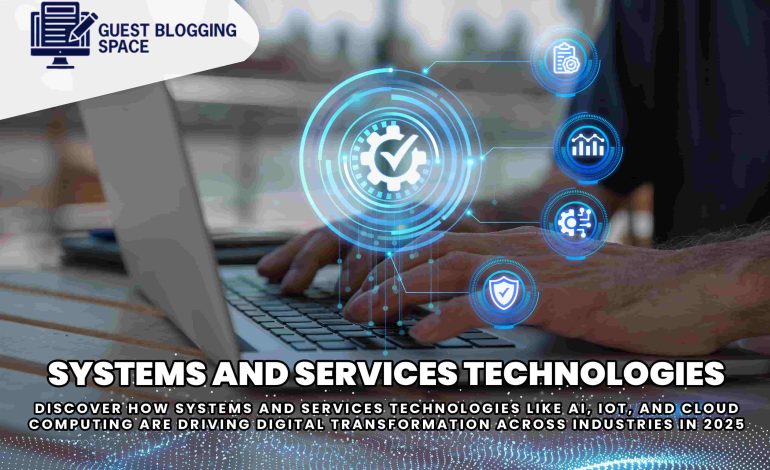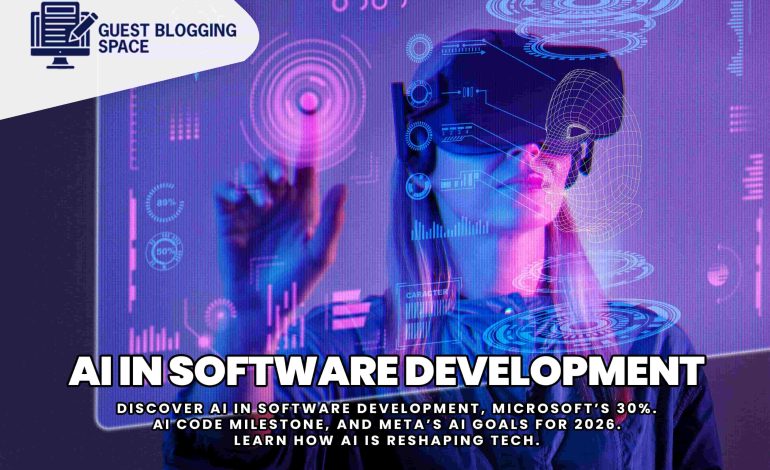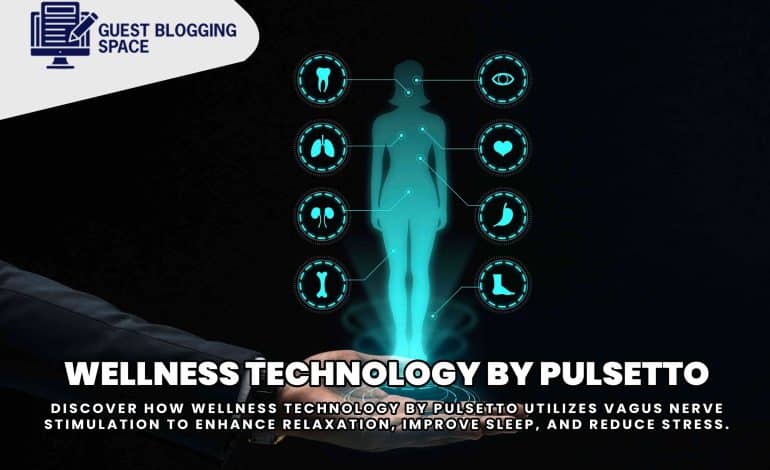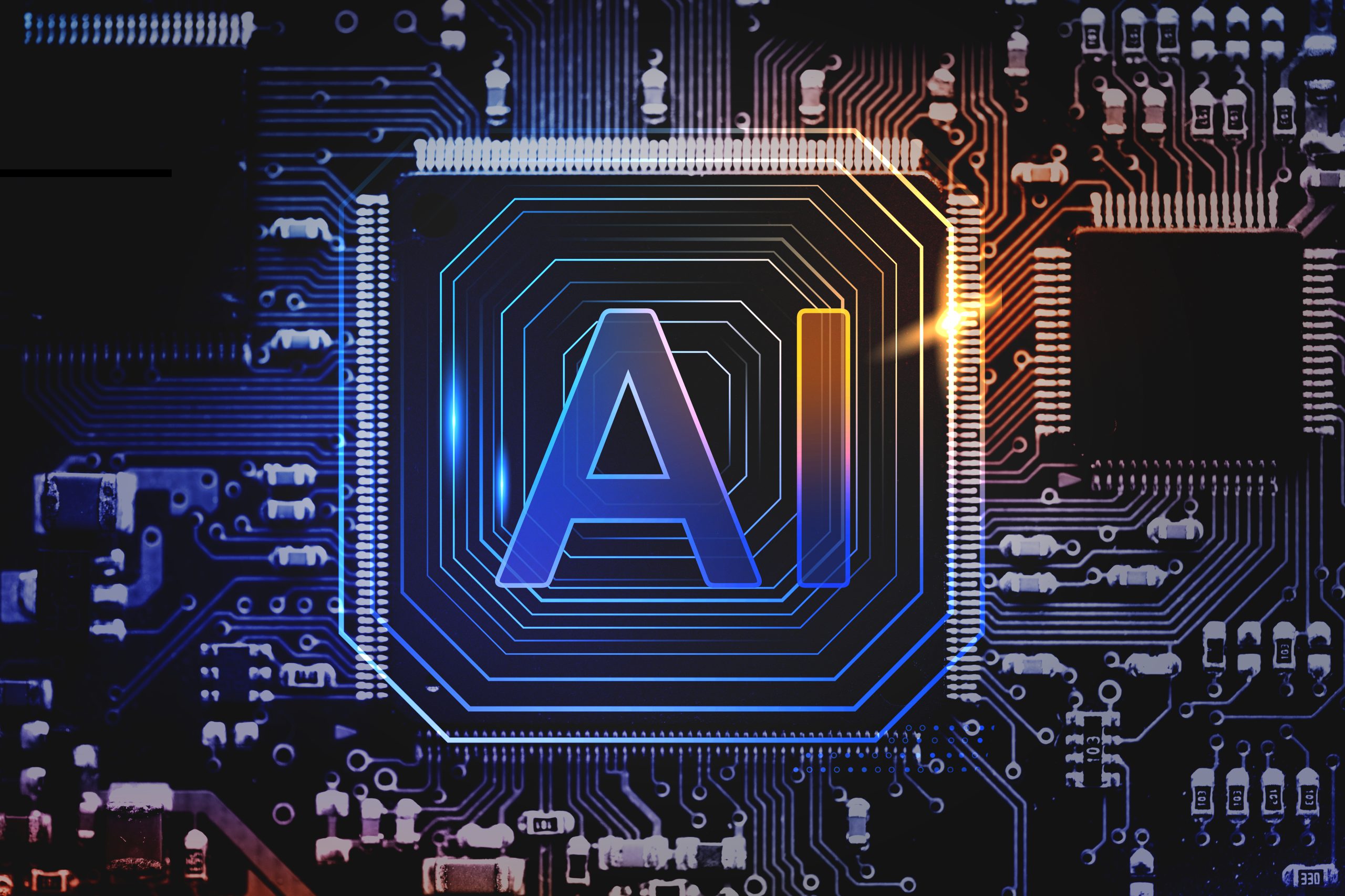Top Systems & Services Technologies Transforming 2025

In a fast-paced digital economy, Systems and Services Technologies are important for modern companies that require agility and development. AI, IoT, and scalable, driven by cloud infrastructure, these techniques optimize workflows, increase cybersecurity, and create fuel for data-controlled innovation. Smart automation, real-time analysis, and interconnected platform organizations enable operational skills and customer-focused distribution. As digital trust becomes necessary, businesses that use reliable, customized systems are better positioned for sustainable success. These intelligent solutions not only change business architecture but also support environmentally friendly practices and regulatory compliance. By entering advanced technology in main strategies, companies ensure future emergency preparedness, flexible infrastructure, and improved ownership value.
The role of system technologies in the modern digital environment
Today’s advanced system technologies have the integration of hardware and software into various data processing ecosystems at the center of the technologies. From the produced-in systems to complex operating systems in smart devices and connected vehicles that distribute data processing resources, these technologies play an important role in modern digital infrastructure. To support stable and efficient operation, a strong network is important to enable infrastructure and high-speed connections to enable spontaneous data exchange and real-time communication. This connection promotes intelligent decisions, which strengthens both industrial applications and consumer electronics to perform innovation and efficiency in many areas.
Large benefits of integrated system and service technologies
- Hardware integration and software across various environments.
- Real-time communication in skilled data flow and devices
- Wisely supports and supports digital innovation
- The consumer drives the advancement of electronics and industrial applications.
- Increases the connections for smooth and efficient operation
Effect of service technologies on commercial business
Service technologies change business operations by offering scalable, flexible, and effective solutions that suit the needs of the business. With the on-demand platforms and improvements of cloud services, organizations are transitioning to models such as IAAS, PA, and Saas to provide fuel to their digital strategies. These technologies enable the spontaneous integration of functionalism into different systems through API and web services, and unlock the entire potential of cloud infrastructure. Mother-in-law has become especially necessary for companies, providing modular and intelligent systems that are easy to distribute and management, distribute and management, and management, and support digital changes.
Large benefits of service technologies for businesses
- Scalable and flexible solution to develop business requirements
- Spontaneous integration in the system through API and web services
- Mother -in -law enables modular, intelligent system for easy distribution
- Operation increases agility and digital changes
- Strengthens businesses to make and live in markets
Core Components Driving Transformation
The influence of cloud computing on modern trade infrastructure.
Cloud computing has proven to be a basic element of today’s digital infrastructure, providing flexible and cost-effective ways for scaling and innovation. Through models like IAAS, companies can use important resources such as virtual machines, storage, and networks without the need for expensive physical hardware. PAAS offers powerful growth platforms and simplifies the creation of applications, while SAAS provides access to online software. Virtualization technologies adapt to the use of resources and ensure efficient operation in various tasks. AWS, Microsoft Azure, and Google Cloud offer strong equipment for scale, such as cloud provider scalability, such as Kubernetes or Castation and VMware integration, operating business development, and efficiency.
Big benefits of cloud computing for businesses
- Scalable and cost-effective resources via IAAS and PAA
- Applications using cloud platforms simplify development and procurement.
- Virtualization technologies increase resource adaptation
- Large cloud suppliers offer powerful scalability tools
- Hardware reduces costs, enables Innovation and Development
POWING BUSINESS WITH AI and ML in system and service technologies
Artificial intelligence (AI) and machine learning (ML) are ahead of digital changes, increasing systems and service technologies in industries. These technologies enable intelligent automation, optimize professional processes, and make data-driven decisions. Predictive analytics and business intelligence tools provide action-rich insights, improve operating efficiency, and customer satisfaction. AI-operated solutions such as chatbots and natural Language Processing (NLP) stream Customer AID, reducing manual intervention. In industries such as health care and diagnostics, computer vision brings a revolution in data analysis, providing fast and more accurate results. The AI-operated automation simplifies complex workflows, improves productivity, and gives organizations the right to succeed in the digital-first scenario.
Increase cybersecurity with advanced technologies
Since digital threats become more sophisticated, cybersecurity is a significant focus for organizations to protect their data. Firewalls and infiltration detection systems, as traditional equipment, are necessary to monitor network traffic and block unauthorized access. However, the complexity of modern attacks requires more advanced solutions. AI-operated Founding technologies now play an important role in identifying and neutralizing real-time risks, providing an extra layer of security.
Strengthening digital rescue through advanced solutions
Including multifactor authentication (MFA) and decisions of zero-trust architecture to a large extent, network security. These strategies ensure that only verified users can access sensitive information, which can reduce the chances of a breach. In addition, an effective identification management system helps prevent unauthorized access by enabling businesses to track and control the data flow. A strong, active risk-reducing strategy is important for the management of dangers that develop and protect business continuity.
Revolutionizing Industries with Edge Computing
Edge Computing fundamentally changes how the industry manages and processes real-time data by transferring close calculations to the data source. This change reduces delay, increases both speed and efficiency. In areas such as autonomous vehicles, where real-time decisions are important, Edge Computing enables fast data processing for safe navigation. Similarly, in smart production, it allows spontaneous monitoring and control of machines, reduces delays, and ensures optimal performance.
Boosting Performance with 5G and Edge Technology
Edge calculates the integration of 5G networks with data processing and improves several abilities, and offers a high-speed connection for fast data transfer. This synergy enables businesses to respond to changing situations in real time, improve operational agility, and improve customer experiences. As several industries use this technology, they feel outstanding levels of efficiency, reliability, and scalability in their digital operations.
Equalization of business operations with an ERP system
Enterprise Resource Planning (ERP) systems are important for modern businesses, offering a centralized solution for managing important tasks such as finance, supply chain, human resources, and purchasing. SAP, Oracle, and Microsoft Dynamics help automate processes, providing a spontaneous flow of real-time data in all departments. This integration improves operational efficiency and ensures stability throughout the business.
Encourage efficiency and compliance through an ERP solution
The ERP system also includes strong equipment for compliance, risk management, and regulatory compliance, which helps to reduce operating risk. By promoting cooperation between departments, these platforms increase communication and improve decision-making. As a result, companies can respond to market changes while maintaining competition, ensuring long-term success and stability.
Change industries with Internet of Things (IoT)
Internet of Things (IoT) This takes shape again how we interact with devices that initially connect them to the digital system. Either in smart homes, cities, or industrial environments, IoT enables real-time communication and automation, making operations more efficient and durable. Through sensors and actuators, connected devices collect and analyze data, improving smart decisions and operating benefits in different fields.
Improve connection and customization with IoT
Techniques such as 5G and Wi-Fi ensure high-speed communication between equipment and increase the performance of applications such as smart networks. When combined with advanced data platforms and dashboards, it allows business analysis companies and cities to adapt resource management and respond to challenges. As IoT develops, it unlocks new opportunities for pairing and automation, operates innovation in industries, and drives urban development.
Increase IT operations with IT Service Management (ITSM)
IT Services Management (ITSM) plays an important role in ensuring the efficient distribution and support of IT services. By taking advantage of frameworks such as ITIL, the organization can streamline service distribution, improve both operational efficiency and service quality. Main elements such as event management and change control address rapid disturbance of businesses, and ensure minimum service and continuous service distribution.
Adaptation of development with DevOps and automation
Integration of DevOps practice into ITSM allows businesses to continuously integrate and increase software distribution through signs (CI/CD), and ensure fast, more reliable updates. Code and automatic pipeline testing improve the development cycle by increasing the infrastructure as infrastructure that encodes and reducing manual errors. It focuses on agility and operational skills, quickly optimizes teams, optimizing to change and continuously promotes improvement in IT service management.
Revolutionary technology with quantum calculation
Quantum calculation is determined to bring revolution into processor power, which can achieve what traditional computers can, and further its boundaries. By taking advantage of the unique properties of the quantum system, this technique enables successes in areas such as autonomous systems, robotics, and AI-operated solutions. Industries such as the health system’s robotics, logistics, and agricultural automation will benefit from the ability to solve complex problems with quantum operations, run smart and more efficient systems.
Supporting Sustainability Through Quantum Computing
In addition to the performance improvement, Quantum supports Compute’s stability by reducing energy consumption and promoting green IT practices. Innovations such as energy-thrifty data centers and low-power chipsets help to shape a circular economy, where hardware recycling and responsible technology use reduce electronic waste. This forward-tagging approach enables adapted resource management, which contributes to a more durable and environmentally friendly future.
Achieve Scalability and Real-Time Insights with Systems & Services Technologies for Professional Success
In today’s dynamic digital scenario, scalability and truth are needed to remain competitive for businesses. By using integrated analysis and automation, organizations can promote operational efficiency, reduce manual functions, and streamline workflows. This connected environment ensures a steady data flow between departments, promotes better cooperation and agility in teams.
Future of Europe with Digital Changes and Systems & Services Technologies
To maintain a competitive advantage, companies must invest in technologies that provide scalability and strong protection. These systems provide a safe, adaptable basis for development, ensuring that operations remain flexible for market changes. By using future evidence solutions, companies thrive not only to meet the current requirements, but also in the digital world that has ever evolved.
Final Thought
Rapid adoption of system and service technologies is a change in industries, opens new opportunities, and creates a smart environment that will shape the way of running businesses are run. Digital equipment acts as a strategic ambassador, streamlining workflows and improving efficiency, while providing organizations the opportunity to innovate and adapt. When industries embrace these state-of-the-art solutions, they are better deployed to flourish in digital economies, where speed, agility, and intelligence are crucial. The ongoing wave of innovations is not only to optimize existing processes, but also paves the way for a smart, more paired future, where businesses are equipped to navigate tomorrow’s challenges and maintain long-lasting success.









